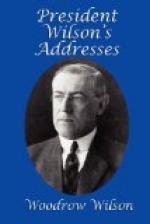The occasion is not of our own making. We had no part in making it. But it is here. It affects us as directly and palpably almost as if we were participants in the circumstances which gave rise to it. We must accept the inevitable with calm judgment and unruffled spirits, like men accustomed to deal with the unexpected, habituated to take care of themselves, masters of their own affairs and their own fortunes. We shall pay the bill, though we did not deliberately incur it.
In order to meet every demand upon the Treasury without delay or peradventure and in order to keep the Treasury strong, unquestionably strong, and strong throughout the present anxieties, I respectfully urge that an additional revenue of $100,000,000 be raised through internal taxes devised in your wisdom to meet the emergency. The only suggestion I take the liberty of making is that such sources of revenue be chosen as will begin to yield at once and yield with a certain and constant flow.
I cannot close without expressing the confidence with which I approach a Congress, with regard to this or any other matter, which has shown so untiring a devotion to public duty, which has responded to the needs of the Nation throughout a long season despite inevitable fatigue and personal sacrifice, and so large a proportion of whose Members have devoted their whole time and energy to the business of the country.
THE OPINION OF THE WORLD
[Address before the American Bar Association, in Continental Hall, October 20, 1914.]
MR. PRESIDENT, GENTLEMEN OF THE AMERICAN BAR ASSOCIATION:
I am very deeply gratified by the greeting that your president has given me and by your response to it. My only strength lies in your confidence.
We stand now in a peculiar case. Our first thought, I suppose, as lawyers, is of international law, of those bonds of right and principle which draw the nations together and hold the community of the world to some standards of action. We know that we see in international law, as it were, the moral processes by which law itself came into existence. I know that as a lawyer I have myself at times felt that there was no real comparison between the law of a nation and the law of nations, because the latter lacked the sanction that gave the former strength and validity. And yet, if you look into the matter more closely, you will find that the two have the same foundations, and that those foundations are more evident and conspicuous in our day than they have ever been before.




